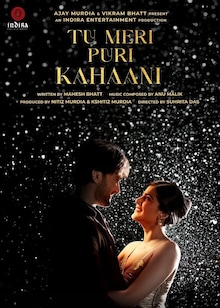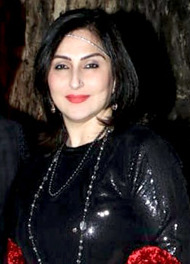

A young aspiring star chases fame and success, but soon finds it hollow and unfulfilling. Just when she feels lost, she discovers true love, teaching her that real connections matter more than superficial attention, ultimately guiding her to a more meaningful and fulfilled life.
September 26
2025
Release Date
Hindi
Language
18 minutes
2 hours
Running Time
Cast


Juhi Babbar


Tigmanshu Dhulia






Hirranya Ojha






Arhaan Pateel






Shammi Duhan






Garima Agarwal






Sachin Lalwani
3.0
Average Rating
The above-mentioned average rating is based on the derived ratings of multiple review platforms
OH Review


Movie Review: Tu Meri Poori Kahani
Plot
"Tu Meri Poori Kahani" takes us on a poignant journey through the eyes of Anika (Hirranya Ojha), a young woman with aspirations of making it big in the film industry. Born as the illegitimate child of a once-prominent filmmaker, her dreams are shadowed by the stigma of her heritage. Anika's world begins to change dramatically when she encounters Rohan (Arhaan Pateel), a subway singer whose talent resonates deeply with her own struggles. Initially, their romance blooms amidst shared dreams and artistic passion, but soon, the harsh realities of the entertainment world begin to tear them apart.
Anika's desire for recognition leads her to compete fiercely for a position in a world that often dismisses her. Rather than just being a face in the background, she longs to carve out her own identity in a place that represents both hope and fear. The film highlights Anika's ambivalence towards her father's attempts to marry her off, showcasing her fiery spirit and independence. When she decides to leave this life behind and move in with Rohan, it initially appears as if the couple’s shared aspirations might meld beautifully. They even launch a music video that unexpectedly gains traction, catching the eye of Raj Mehta (Shammi Duhan), a high-powered film studio owner.
Raj's offer of a five-year contract holds the promise of success, but it comes at a grave cost: he demands that Anika sever ties with Rohan. This creates a tumultuous emotional conflict, as the allure of stardom stands in stark contrast to her love life. The film thus probes deeply into Anika's internal battle between fame and love, but there are moments where the pacing falters. After the interval, the narrative takes an abrupt shift, skipping four years into the future. This leap makes it hard for the audience to fully grasp the emotional weight of Anika's climb to fame and Raj's controlling nature.
While the driving theme of how fame fails to patch over one's inner scars is a compelling one, it remains curiously underexplored. The pacing wobbles at times, diluting both Anika’s successes and the engaging possibilities of her relationship with Rohan. The film also teeters perilously close to a predictable narrative, sacrificing the raw emotional engagement that could have pulled viewers in deep. Though it starts with a fiercely relatable audition scene, these unique moments become increasingly sporadic, leading to a somewhat uneven storytelling experience.
Acting
In "Tu Meri Poori Kahani," Hirranya Ojha delivers a commendable performance as Anika, transitioning from moments of self-doubt to flashes of resolute ambition. Her emotional portrayal effectively captures the complexity of a young woman trapped between her dreams and the stigma of her past. While her performance shines brighter in the latter half of the film, her initial depiction of vulnerability resonates well with the audience. Hirranya brings a refreshing depth to a character that defies traditional cinematic heroines, establishing Anika as a relatable figure in a world that often demands perfection.
Arhaan Pateel, portraying Rohan, is equally magnetic. He embodies the supportive boyfriend archetype with grace, showcasing a mix of ambition and selflessness. His nuanced performance conveys multiple layers, portraying Rohan as both a dreamer and a grounding force for Anika. He captures the hopes and struggles of individuals who are drawn to the glittering world of fame yet remain aware of its harsh realities. Shammi Duhan's character, Raj Mehta, is played with sufficient gravitas, though he occasionally veers into the territory of stereotype, emphasizing the archetype of the controlling showbiz mogul.
Tigmanshu Dhulia, as Anika's father, brings weight to the role of the fading filmmaker. His portrayal adds a sense of depth and authenticity, highlighting the complexities of family relationships and the burdens of legacy. Juhi Babbar, as Anika’s mother Swara, leaves an impressive mark, skillfully illustrating the pain of an unfulfilled life intertwined with a daughter’s aspirations. The ensemble cast, led by these talented actors, makes the emotional weight of the story palpable, but the overall character development could have benefitted from a more substantial narrative focus.
Cinematography
The cinematography in "Tu Meri Poori Kahani" enhances the narrative's emotional depth and visual appeal. Drawing from the chaotic yet vibrant backdrop of the film industry, cinematographer showcases both the glamorous and gritty aspects of Anika's world. The visuals transition seamlessly between the intimate moments of love shared between Anika and Rohan and the vast, often isolating, expanse of the city where they strive for success. Each frame evokes the raw textures of city life, helping to ground the characters’ struggles in a realistic setting.
The use of light plays a critical role in framing the characters’ emotions throughout the film. Moments of despair are often shrouded in shadow, while scenes of triumph are bathed in warm hues, reflecting Anika’s journey as she navigates through various emotional states. The clever use of close-ups during pivotal scenes captures subtle shifts in expression, drawing the audience into the intricate dance of ambition and love. Whether it’s Rohan's soulful subway performances or Anika's auditions, each visual moment feels thoughtfully curated, elevating the storytelling experience.
Despite these strengths, there are instances where the pacing and continuity disrupt the visual flow. Some transitions from one scene to another could have been smoother, as a few abrupt cuts lead to a slightly jarring viewing experience. However, the overall cinematography remains an integral part of the film, capturing the duality of dreams and realities that Anika must confront. The responsible use of color palettes also adds emotional texture, creating a visual narrative that resonates with the audience, echoing the film's themes of longing and ambition.
Direction
In her directorial debut, Suhrita Das navigates the challenges of storytelling with both sensitivity and poise, managing to capture the nuances of ambition and love within the complex landscape of the film industry. The collaboration with Mahesh Bhatt, known for crafting heartfelt narratives, is evident in the film’s emotional undertones, yet Das's unique vision shines through. She balances the film's darker themes with moments of levity, allowing the audience to connect with the characters on a deeper level. The dialogue is particularly noteworthy, featuring lines that resonate long after the film concludes, such as "You cannot have two addictions together in life." This succinctly encapsulates the film’s inherent conflict between love and fame.
However, while the first half of the film establishes a solid foundation with compelling character dynamics, the pacing falters after the interval. The narrative's unexpected leap ahead could have been handled more thoughtfully, as it weakens the emotional investment built during the earlier scenes. The resulting unevenness detracts from the intensity of Anika and Rohan's relationship, which becomes a focal point in the second half. Das’s direction showcases potential, but the storytelling momentum suffers due to missed opportunities that could engage the audience further.
The film is aptly characterized as a slow burn, catering to viewers drawn to introspective storytelling. It encourages contemplation about the whimsical nature of fame and its effects on genuine relationships. The poignant moments never quite achieve the heights they aim for, but they still highlight the universal quest for love and validation. As Das continues her career, one can hope that she will refine her storytelling approach, drawing from this promising debut to create more nuanced and powerful narratives in future projects.
Conclusion
"Tu Meri Poori Kahani" emerges as a heartfelt exploration of ambition, love, and the pressures of the film industry. While it treats delicate themes with care, it occasionally stumbles with pacing and character development that detracts from its emotional weight. Anika’s journey, marked by her struggles with familial expectations and societal pressures, offers relatable moments that resonate with a youthful audience. Yet, the film's predictability and uneven storytelling render it less than gripping at times.
Despite these flaws, the performances from the cast, especially Hirranya Ojha and Arhaan Pateel, shine, bringing depth and authenticity to the characters. Anu Malik's music, featuring some lovely tracks, adds an emotional resonance that complements the film’s narrative. Ultimately, while "Tu Meri Poori Kahani" might not break new ground, it captures a glimpse of the dreams and desires that haunt the youthful spirit.
For audiences drawn to slower, introspective narratives over fast-paced entertainment, this film provides a thoughtful meditation on the balance between personal dreams and societal expectations. With the right word-of-mouth and appreciation for its genuine efforts, "Tu Meri Poori Kahani" stands a chance of finding its audience, garnering the attention it duly deserves. The film holds a mirror to contemporary dilemmas, posing questions that many in today’s generation grapple with: Is success truly meaningful if it comes at the cost of personal relationships? For that reason alone, it’s worth a watch, earning itself a modest but affirming rating of 3 stars.
Share this review
The Great Reviews
Times of India
More like this
Mardaani 3
In Mardaani 3, in a gripping race against time, brave officer Shivani Shivaji Roy returns to save girls who have mysteriously vanished. With danger lurking a...
Azad Bharath
In Azad Bharath, neera Arya becomes a courageous freedom fighter in India's first women's army, founded by Subhas Chandra Bose. As she battles for independen...


